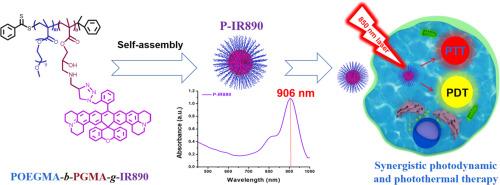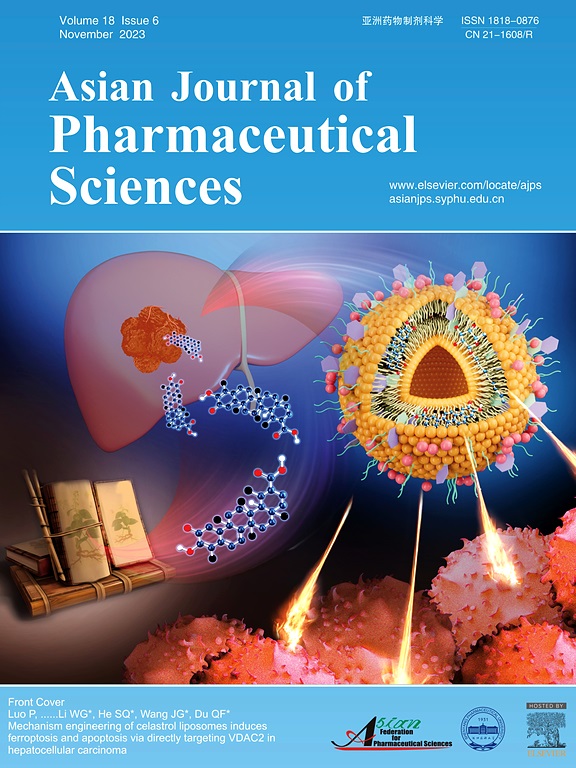基于非氰基染料构建的 P-IR890 纳米光敏剂的深层近红外光激发稳定协同光动力和光热疗法
IF 10.7
1区 医学
Q1 PHARMACOLOGY & PHARMACY
引用次数: 0
摘要
以 IR780 为代表的氰基染料可在近红外(通常为 808 纳米)光的刺激下实现协同光动力疗法(PDT)和光热疗法(PTT)。遗憾的是,近红外激发的氰基染料的稳定性并不令人满意。这些氰基染料在光治疗过程中会受到自身产生的活性氧(ROS)的攻击,导致结构损坏和快速降解,这对光治疗是致命的。为解决这一问题,我们的团队精心设计并合成了一种新型非氰基染料(IR890)。IR890 的最大吸收波长位于深近红外区(890 纳米),有利于进一步提高组织穿透深度。重要的是,IR890 在深近红外光的持续照射下表现出良好的稳定性。为了提高亲水性和生物相容性,将疏水性 IR890 染料接枝到亲水性聚合物(POEGMA-b-PGMA-g-CCH)的侧链上,然后通过点击化学反应合成 POEGMA-b-PGMA-g-CCH。然后,利用合成的POEGMA--PGMA--IR890双亲聚合物制备了P-IR890纳米光敏剂自组装方法。在深近红外光(850 nm,0.5 W/cm,10 min)照射下,P-IR890的染料降解率小于5%。然而,在相同的光输出功率密度和辐照时间下,IR780 几乎完全降解。此外,P-IR890 还能同时稳定地产生大量的 ROS 和热量。通过深近红外光照射单个光敏剂,就能有效地实现 PDT 和 PTT 的稳定协同联合治疗,这在国际上尚属罕见。P-IR890 通过细胞凋亡途径显示出良好的抗肿瘤效果。因此,P-IR890 可以为光敏剂的设计提供新的视角,并为 PDT 和 PTT 的协同联合治疗提供新的机遇。本文章由计算机程序翻译,如有差异,请以英文原文为准。

Deep near infrared light-excited stable synergistic photodynamic and photothermal therapies based on P-IR890 nano-photosensitizer constructed via a non-cyanine dye
The cyanine dyes represented by IR780 can achieve synergistic photodynamic therapy (PDT) and photothermal therapy (PTT) under the stimulation of near-infrared (NIR) light (commonly 808 nm). Unfortunately, the stability of NIR-excited cyanine dyes is not satisfactory. These cyanine dyes can be attacked by self-generated reactive oxygen species (ROS) during PDT processes, resulting in structural damage and rapid degradation, which is fatal for phototherapy. To address this issue, a novel non-cyanine dye (IR890) was elaborately designed and synthesized by our team. The maximum absorption wavelength of IR890 was located in the deep NIR region (ca. 890 nm), which was beneficial for further improving tissue penetration depth. Importantly, IR890 exhibited good stability when continuously illuminated by deep NIR light. To improve the hydrophilicity and biocompatibility, the hydrophobic IR890 dye was grafted onto the side chain of hydrophilic polymer (POEGMA-b-PGMA-g-C![]() CH) via click chemistry. Then, the synthesized POEGMA-b-PGMA-g-IR890 amphiphilic polymer was utilized to prepare P-IR890 nano-photosensitizer via self-assembly method. Under irradiation with deep NIR light (850 nm, 0.5 W/cm2, 10 min), the dye degradation rate of P-IR890 was less than 5%. However, IR780 was almost completely degraded with the same light output power density and irradiation duration. In addition, P-IR890 could stably generate a large number of ROS and heat at the same time. It was rarely reported that the stable synergistic combination therapy of PDT and PTT could be efficiently performed by a single photosensitizer via irradiation with deep NIR light. P-IR890 exhibited favorable anti-tumor outcomes through apoptosis pathway. Therefore, the P-IR890 could provide a new insight into the design of photosensitizers and new opportunities for synergistic combination therapy of PDT and PTT.
CH) via click chemistry. Then, the synthesized POEGMA-b-PGMA-g-IR890 amphiphilic polymer was utilized to prepare P-IR890 nano-photosensitizer via self-assembly method. Under irradiation with deep NIR light (850 nm, 0.5 W/cm2, 10 min), the dye degradation rate of P-IR890 was less than 5%. However, IR780 was almost completely degraded with the same light output power density and irradiation duration. In addition, P-IR890 could stably generate a large number of ROS and heat at the same time. It was rarely reported that the stable synergistic combination therapy of PDT and PTT could be efficiently performed by a single photosensitizer via irradiation with deep NIR light. P-IR890 exhibited favorable anti-tumor outcomes through apoptosis pathway. Therefore, the P-IR890 could provide a new insight into the design of photosensitizers and new opportunities for synergistic combination therapy of PDT and PTT.
求助全文
通过发布文献求助,成功后即可免费获取论文全文。
去求助
来源期刊

Asian Journal of Pharmaceutical Sciences
Pharmacology, Toxicology and Pharmaceutics-Pharmaceutical Science
CiteScore
18.30
自引率
2.90%
发文量
11
审稿时长
14 days
期刊介绍:
The Asian Journal of Pharmaceutical Sciences (AJPS) serves as the official journal of the Asian Federation for Pharmaceutical Sciences (AFPS). Recognized by the Science Citation Index Expanded (SCIE), AJPS offers a platform for the reporting of advancements, production methodologies, technologies, initiatives, and the practical application of scientific knowledge in the field of pharmaceutics. The journal covers a wide range of topics including but not limited to controlled drug release systems, drug targeting, physical pharmacy, pharmacodynamics, pharmacokinetics, pharmacogenomics, biopharmaceutics, drug and prodrug design, pharmaceutical analysis, drug stability, quality control, pharmaceutical engineering, and material sciences.
 求助内容:
求助内容: 应助结果提醒方式:
应助结果提醒方式:


